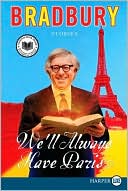Short Fiction Review #16: We’ll Always Have Paris by Ray Bradbury

In his for the most part disdainful observations of science fiction as a cultural phenomenon, The Dreams Our Stuff is Made Of, Thomas Disch characterizes Ray Bradbury, among other notable genre authors of the post- WW II generation, as being in “affluent decline” by the 1980s, suffering from “the literary equivalent of repetition compulsion” (122). He also rues that SF is a young man’s game, not because it is physically exhausting, but because the marketplace focuses on a largely juvenile audience in terms of intellectual temperament, if not actual age. Established authors such as Bradbury who remain successful within the genre do so because they have a “permanent mind-set that is ‘forever-young'” (213). I don’t think this is meant as a compliment.
I can only wonder what Disch may have thought of Bradbury’s 2007 Pulitzer Prize special citation. But, I have to admit he has a point.
Quick, name any Bradbury fiction written after the 1960s that had remotely any affect on you similar to The Martian Chronicles (1950), The Illustrated Man (1951), Fahrenheit 451 (1953), Dandelion Wine (1957), A Medicine for Melancholy (1959) or Something Wicked This Way Comes (1962)? And if you weren’t a baby boomer reading any of these works at the so-called golden age of wonder, i.e. 12, and most likely male and most likely a bit of a nerd, during an era roughly contemporaneous to their publication, give or take a decade, you probably have no idea what the point of the question is.
As an aforementioned male baby boomer nerd whose reading of The Martian Chronicles in the fifth grade weaned me off of Hardy Boys books (for further details about this awakening, see this), Ray Bradbury is why you’re reading this (go ahead, blame him). Bradbury was my literary hero, though, for me, these days he’s something of a faded hero. The problem is that I’ve grown up, while Bradbury seems stuck in perpetual small town adolescence, a side trip to Europe or Mars or Los Angeles notwithstanding. For some readers, sometimes you can’t go home again.
…
 As
As 